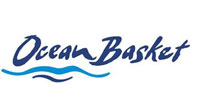The Ocean Basket Group is well aware of the environmental impact fishing and aquaculture activities has on the marine ecosystems and is determined to tackle the issue head-on.
Centuries of over-exploitation of our most precious resource has had a heavy hand on our oceans. In some waters, the global demand for seafood and fish has literally driven once flourishing species to the brink of collapse. Commercial fleets are forced to venture deeper into the ocean for viable catches and these catches are costing consumers far more than they ever have before.
"When one looks at the figures it's clear that this is a massive and global problem," said Grace Harding of Ocean Basket. "The Food and Agriculture Organisation reports that 80% of global fish stocks are being fished either at or above sustainable levels. This is evident in South African waters. Because of the different sectors targeting our resources and the many different methods used to catch fish, our fish stocks simply cannot replenish themselves fast enough. We believe that supporting well-managed fisheries and aquaculture operations is critical not only in order to build a sustainable business model, but also to foster the long-term health of marine ecosystems, species and livelihoods," she said.
Legal and traceable products
Ocean Basket - with its 175 franchised outlets - has pledged to support and promote sustainable seafood choices. They aim to create market driven incentives to catalyse change at sea; to protect all stakeholders as well as the environment by ensuring their suppliers provide legal and traceable products from sustainable and responsibly managed sources, and enable consumers to make informed decisions about their seafood choices.
In line with these beliefs, Ocean Basket commits to ensuring that by 2017 the group will only sell wild-capture seafood and fish products that are certified as sustainable by the Marine Stewardship Council (MSC), or categorised as green by WWF-SA's Southern African Sustainable Seafood Initiative (WWF-SASSI), or sourced from fisheries that are actively engaged in credible, time-bound improvement projects.
Credibility of projects
"In co-operation with the WWF, Ocean Basket will determine the credibility of these improvement projects on a case-by-case basis and will provide guidance to fisheries and aquaculture facilities as to what constitutes a credible, time-bound improvement project," explained Harding.
"We are also aware that the Aquaculture Stewardship Council (ASC) certification may not be developed for all aquaculture species that it procures by 2020. Therefore, as a minimum requirement, all applicable source aquaculture operations from which Ocean Basket procures will be required to formally commit to achieving the ASC certification by this date".
Harding concluded, "A key ingredient to the success of Ocean Basket is that we control the quality of ingredients centrally. This way we can check that everything that is used is of the utmost quality, especially if there are shortages in specific areas. Just as strongly as we believe in bringing affordability to our customers, we also believe that our customers have a right to sufficient and accurate information through adequate labelling, in order to be able to make environmentally responsible choices. As such, Ocean Basket will ensure that by the end of 2014 the following species' information is publicly available in store for all our seafood and fish products sold: common and scientific species' name, country of origin, and catch or farming method."









































